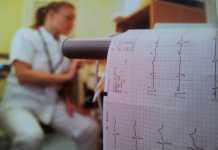June 2006: Scientists are making headway in exploring the potential future use of stem cells to treat heart disease, according to a review article in the current issue of Nature (June 29, 2006).
Authored by Gladstone Institute of Cardiovascular Disease Director Deepak Srivastava, MD, and Gladstone Institutes postdoctoral scholar Kathryn Ivey, PhD, the paper cites a better understanding of the following areas of research:
- the developmental processes within the heart that can be reproduced using pluripotent embryonic stem cells (these are early stem cells that can grow into almost any cell type)
- the cues that control multipotent cardiac stem cells (these stem cells, which have less developmental potential than embryonic stem cells, produce different types of cells that make up the heart)
- the ability of circulating progenitor cells (early-stage cells that have not yet differentiated, or specialized) to produce factors that are sufficient to invoke cell survival or repair responses in damaged heart cells
"The use of stem cells to generate replacement cells for damaged heart muscle, valves, vessels and conduction cells holds great potential," says Srivastava, who is also a UCSF professor of pediatrics and the Wilma and Adeline Pirag Distinguished Professor in Pediatric Developmental Cardiology. "Although there are clearly many obstacles to overcome, it is significant that a roadmap of the derivation and use of stem cells for human heart disease is now conceivable."
In the Nature article, Srivastava and Ivey point to several challenges ahead:
- Developing the ability not only to guide and expand stem cells into the cardiac lineage but also to repress alternative cell fates
- Developing methods for safe delivery and proper integration of stem cells within patients' heart tissue to avoid such complications as arrhythmias (irregular heart beat)
- Solving immunological issues surrounding rejection
"Exciting new findings over the past 5 years indicate that stem cells could prove effective as protective or regenerative cardiac therapies," says Ivey, who was named in April one of seven current postdoctoral fellows participating in the Gladstone's new stem cell training program, funded by the California Institute for Regenerative Medicine. "The adult heart seems to have reservoirs of cardiac progenitor cells--adult stem cells that are destined to become cardiovascular cells--that may be able to replace a slow loss of cells over a lifetime. The coming years will undoubtedly bring new developments and technologies to unravel these processes, leading to clinical applications of stem cell-based therapies for heart disease."
Continue Reading Below ↓↓↓
GICD is one of three research institutes of The J. David Gladstone Institutes, a private, nonprofit biomedical research institution. It is affiliated with UCSF, a leading university that consistently defines health care worldwide by conducting advanced biomedical research, educating graduate students in the life sciences, and providing complex patient care. For further information, visit www.gladstone.ucsf.edu and www.ucsf.edu.
Source: Gladstone Institutes










